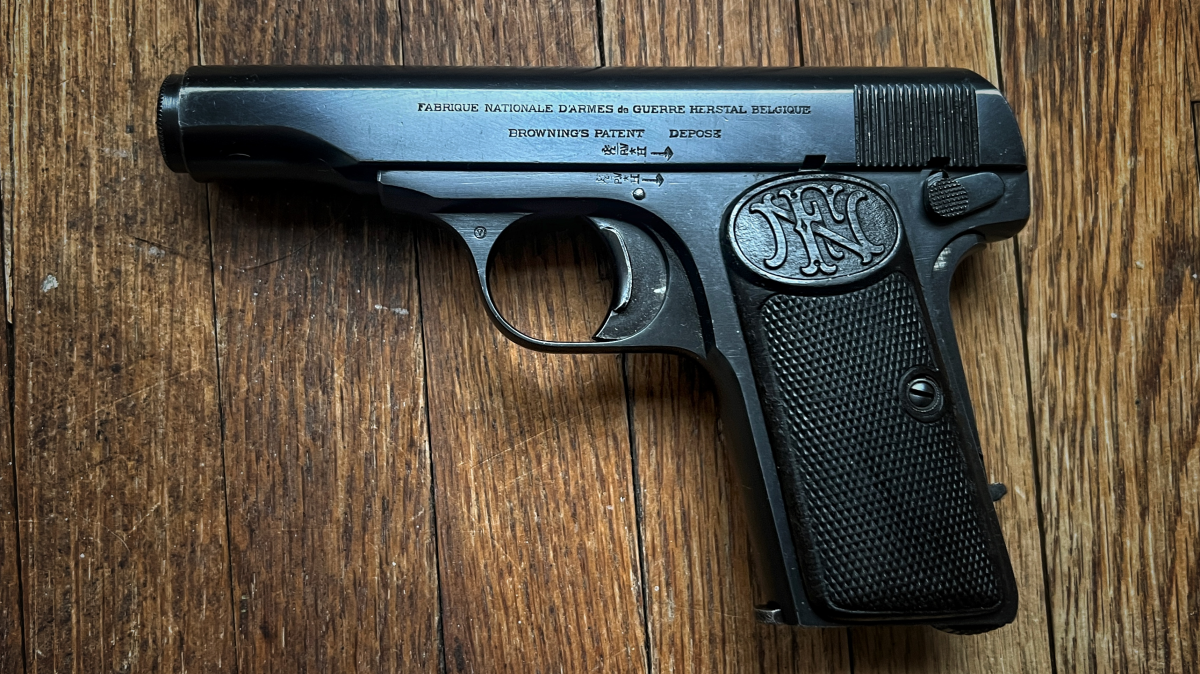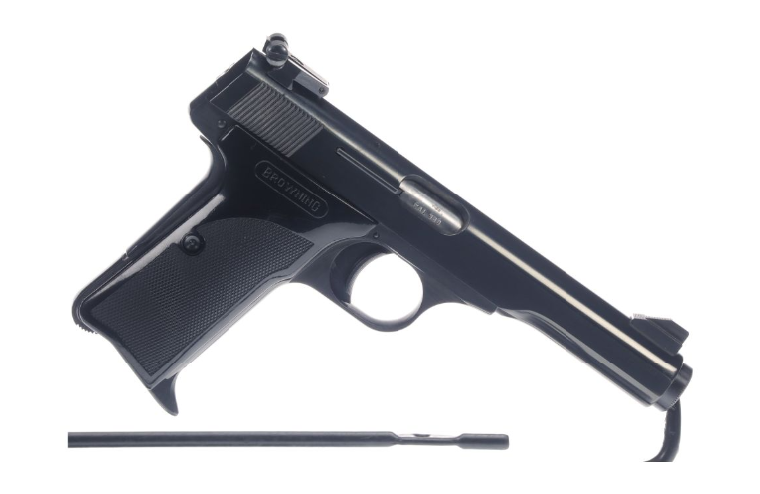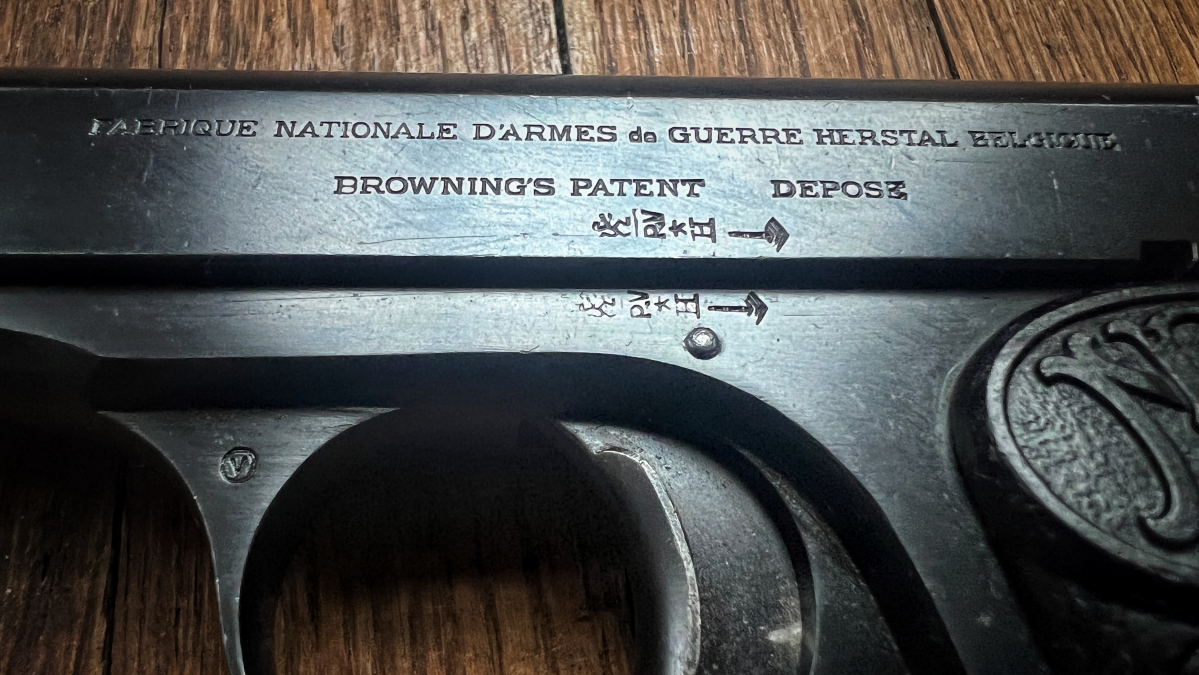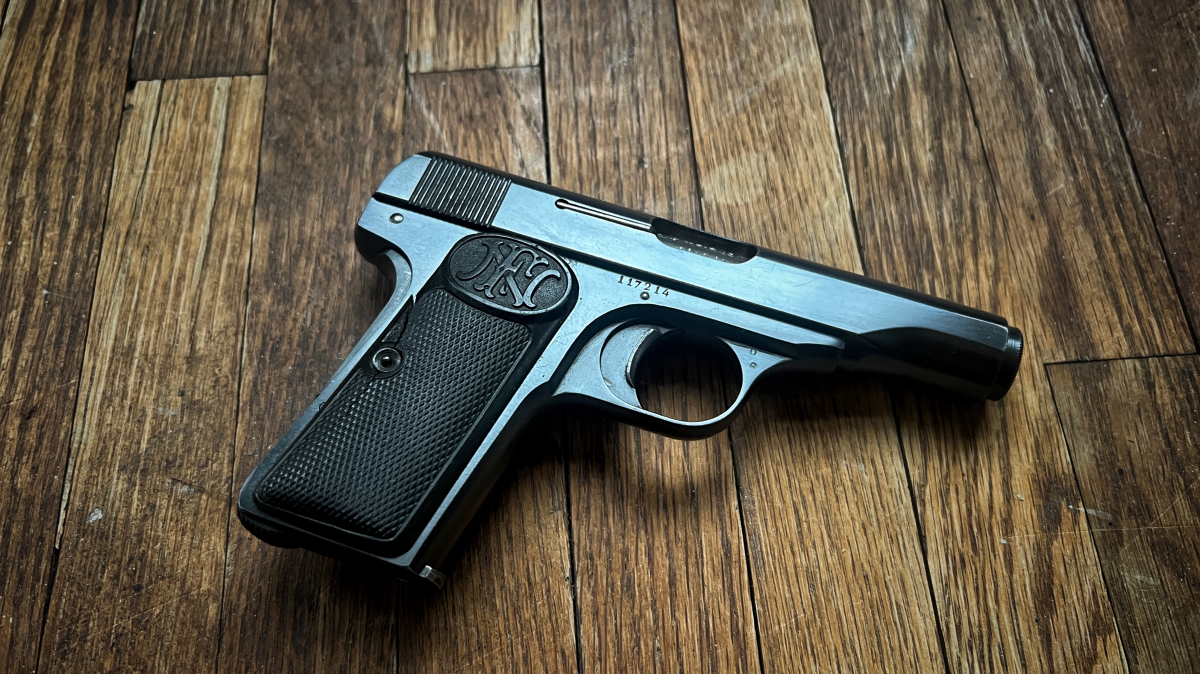Curious Relics #036: Same Pistol Different Package – FN 1910
Sam.S 04.06.22
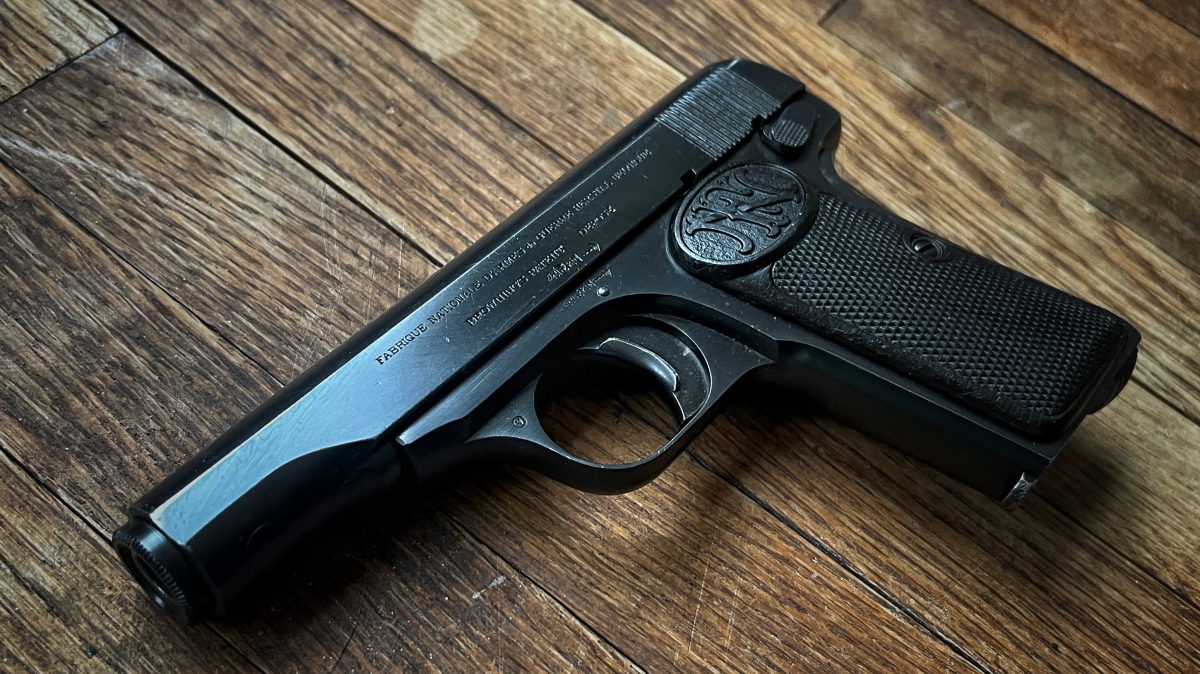
Welcome, if you are a newcomer to this fun bi-weekly segment of AllOutdoor.com! The last time around I covered the history of a pistol shadowed in dread since it was used to ignite the first fires of World War One, a stain on the world and the people who experienced it. Today we are jumping back into the FN 1910 and its variations and how to date your personal FN 1910. This pistol was a popular carry piece, but had a bit of a bumpy ride as far as its production. Let’s dive right into the rabbit hole!
Welcome to our recurring series of “Curious Relics.” Here, we want to share all of our experiences, knowledge, misadventures, and passion for older firearms that one might categorize as a Curio & Relic – any firearm that is at least 50 years old according to the ATF. Hopefully along the way you can garner a greater appreciation for older firearms like we do, and simultaneously you can teach us things as well through sharing your own expertise and thoughts in the Comments. Understanding the firearms of old, their importance, and their development which lead to many of the arms we now cherish today is incredibly fascinating and we hope you enjoy what we have to share, too!
Variations: FN 1910
The FN 1910 was the follow-up to both the great success of the FN 1900 and the subtle appreciation of the 1905 Vest Pocket. It was designed to have a very low bore axis and be an excellent carry gun with some low profile style sights, chambered in common reliable cartridges, and interchangeable in those cartridges at that. Interchangeable in the sense of a barrel swap and new recoil spring if need be. The FN 1910 was appreciated throughout its whole history but always had a cloud over its name for being the gun used in the assassination of Archduke Franz Ferdinand of Austria. Throughout time its production was troubled by war and importation laws which resulted in the variations that lie below.
- FN 1910: Our gun today. Designed in 1908, patented in 1909, and its production began in 1912. Designed to have interchangeable parts between 32 ACP and 380 ACP, only requiring a barrel change to swap between cartridges. Sleek, small (will fit in the palm of your hand), very low profile sights, reliable, and simple. 32 ACP or 380 ACP, 3 7/16 inch barrel. Including the Browning Model 55, there were 701,266 FN 1910 pistols manufactured.
- FN 1922: Also referred to as the FN 1910/22. 32 ACP or .380 ACP, 4 1/2 inch barrel. These were the result of a military contract and made special for the Yugoslavian military in 1922. They are not necessarily an upgrade but more of a military form of the Model 1910. The Model 1922 has longer barrel, longer grip frame, and higher capacity of 9+1 (32 ACP) or 8+1 (380 ACP). They had black horn/plastic grips until Germany changed them to wooden grips. They were eventually sold to countries such as France, Netherlands, Greece, Germany, and Turkey up until the FN factory was seized by the Nazis in the early 1940s. From there they were manufactured for the German military until the end of the war in Europe. Roughly 500,000 were manufactured.
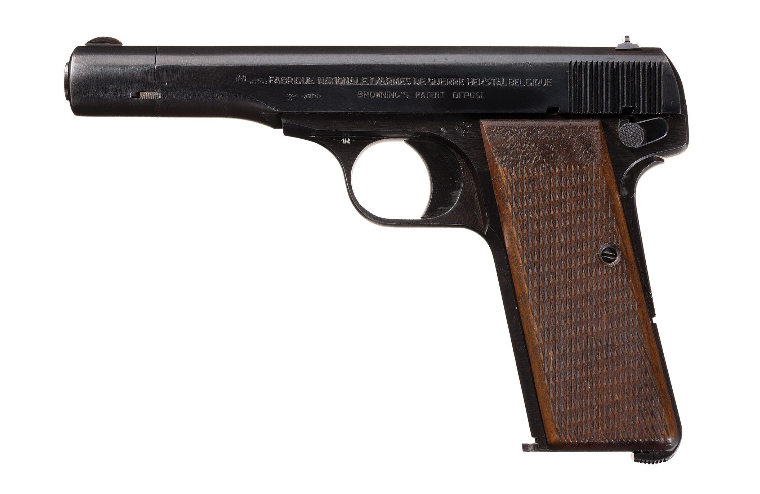
Lot 3334: Nazi Fn 1922 Pistol with Holster and Extra Magazine. (n.d.). Rock Island Auction Company. photograph. Retrieved March 24, 2022, from https://www.rockislandauction.com/detail/69/3334/nazi-fn-1922-pistol-with-holster-and-extra-magazine.
- Browning Model 55: The American Browning company began to import FN made FN 1910s to be sold in the United States. Thes pistols were introduced in 1954 as the Model 55 and would be sold until they were discontinued in 1969. They were exclusively in the now more popular 380 ACP cartridge, also featured black plastic Browning grips, and roughly 120,000 were manufactured and imported. They were the exact same as any other Model 1910.

Lot 155: Belgian Browning Model 1955 Semi-Automatic Pistol. (n.d.). Rock Island Auction Company. photograph. Retrieved April 5, 2022, from https://www.rockislandauction.com/detail/2050/155.
- Browning Model 71: Browning introduced this as the Browning Standard 380. It is basically a modified FN 1922 pistol. 380 ACP, 4 1/2 inch barrel, grip safety, target sights, Browning grips, and pinky extension on the magazine floorplate. These were newly imported to the united states and had to be modified to comply with the Gun Control Act of 1968. These were only manufactured from 1971 to 1974
Lot 189: Browning Model 10/71 Semi-Automatic Pistol. (n.d.). Rock Island Auction Company. photograph. Retrieved March 23, 2022, from https://www.rockislandauction.com/detail/2049/189.
Dating: FN 1910
Besides FN’s lack of concern to keep track of their manufacturing dates or coming up with any sort of code you have to cut the company some slack. In the early part of the 20th century, the company had large ups and equally large downs. They were shut down during World War One and Occupied and production was modified in World War Two. New models did not have a proper distinction or serial number separation. In fact, some serial numbers became duplicates and became mixed into several variations. This is why determining a date for an FN 1910 is very tough. You basically have to rely on proof marks and font type and size changes.
From excerpts found in the Anthony Vanderlinden book FN Browning Pistols, I found that in 1919 following WWl serial numbers started at 70,000 and halted at around 460,000 in 1940 with the German occupation of Belgium. So at the very least, there is a time frame in itself. Aside from this chunk of time font style and case style can narrow things further. The font on the slide will either be in Serif or Sans Serif. and the “de” portion of the address will either read “D’ARMES de GUERRE” or “D’ARMES DE GUERRE.
- From what I have read if your slide reads in Sans Serif and has a lowercase “de” then it is from 1919 to 1925.
- I have read if your slide reads in Serif font and has a lowercase “de” then it is from 1925 to 1929. (My pistol serial number 117214 should lie in this range since it has both Serif font and a lowercase “de”)
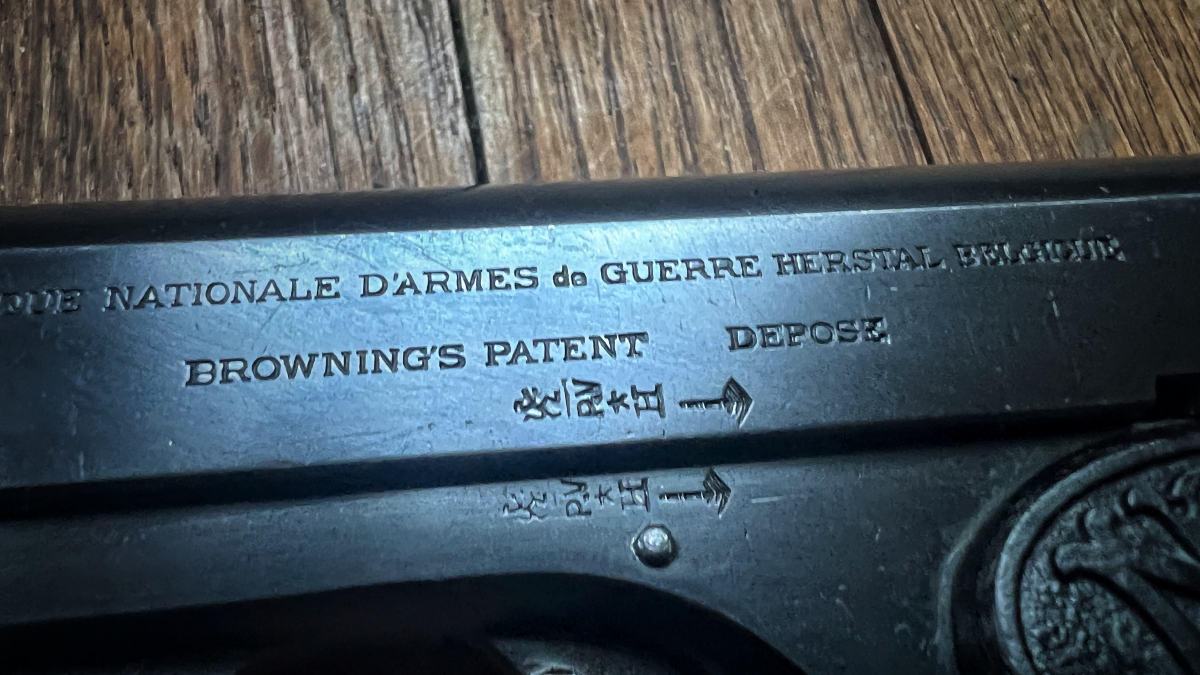
From the information above it would be easier to narrow a gun with a capital “DE” to be made sometime after 1930. It would be hard to put a range from that since there were many duplicate serial numbers and all sorts of proof marks yet to be deciphered by folks who have more time and more examples on hand.
Note: If anyone has further methods of narrowing dates down please share in the comments below!
End of Part Two: FN 1910
Here draws an end to the second part of our exploration of the FN 1910. The variations are very cool and I hope to one day dive deeper into one of those. A point of note is I actually had the chance to see a Browning 71 the other day and was impressed by its features. The dating of the FN 1910 is a frustrating affair but it is hard to blame a company that was repeatedly stopped by war. I am sure all sorts of information was lost in the process. To anyone who is not familiar with the difference between Sans Serif and Serif font, I believe the font these articles are published in is Sans Serif which presents itself as a more plain and rounded font whereas Serif is a more “proper” or old-school style with edges and corners that hang and curve over. Check out the differences in a capital “T”. Sans Serif the “T” will be two simple lines and in Serif the top line ends will hang over. Enough with the English lesson! I hope everyone enjoyed this article on the FN 1910 and its dating and variations!
In closing, I hope our Curious Relics segment informed as well as entertained. This all was written in hopes of continued firearm appreciation and preservation. We did not just realize how guns were supposed to look and function. It was a long and tedious process that has shaped the world we live in. So, I put it to you! Is there a firearm out there that you feel does not get much notoriety? What should our next Curious Relics topic cover? As always, let us know all of your thoughts in the Comments below! We always appreciate your feedback.
